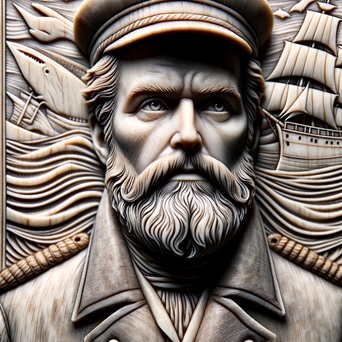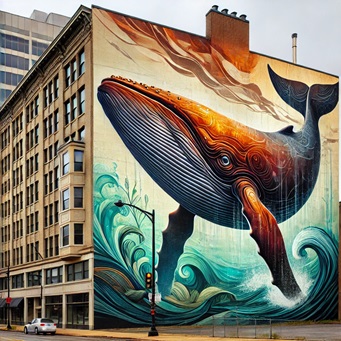The Snworb
In the earliest days of the Lake Erie Whaling Company, when the wind swept across the water in mighty gales and the sun rose on waves that gleamed like polished glass, there was a belief among the men of Cleveland that this inland sea was no ordinary lake. It was a vast, bountiful expanse, rumored to hold wonders beneath its surface—wonders that could be claimed by any man with the nerve to cast his net and harpoon deep enough.
The creatures of their pursuit were freshwater whales, leviathans of peculiar distinction, whose presence in Lake Erie had perplexed and enchanted the settlers for generations. These whales were said to be the guardians of the lake’s depths, beings of ancient majesty that swam with the languid grace of a lazy summer afternoon. They were the color of sunlit copper, their hides mottled with spots of brown and amber, and their eyes, though fixed and glassy, seemed to convey a deep, imperturbable wisdom. The townsfolk, at first, had revered these creatures as the lake's divine custodians, protectors of the waters' delicate equilibrium.

Yet reverence, in the presence of human ambition, can swiftly turn to covetousness. The Lake Erie Whaling Company, established by men of enterprise and fervor, was driven by a singular mission: to seize the wealth that swam just beneath the lake's placid surface. These were men unencumbered by the quaint notions of sanctity and balance. They saw in the great whales not marvels to be preserved, but commodities to be rendered into oil, blubber, and bone.
Captain Enoch Purdle, the leader of the whaling venture, was a man who embodied this new spirit of ruthless extraction. Broad-chested and narrow-eyed, with a beard that jutted like the prow of a ship, Purdle was not one to be daunted by the peculiarities of hunting whales in a lake. "A whale is a whale," he would say, "be it born in the sea or suckled on spring-fed waters. And all whales bleed the same." His mantra was echoed by his men, a ragtag assortment of the bold and the desperate, who took to their boats with harpoons and hooks, their eyes filled with the gleam of prospective riches.
In those early days, the hunt was almost too easy. The whales, unaccustomed to such predation, swam leisurely through the nets and traps as though playing some ancient game, unaware of the doom that awaited. The whalers, emboldened by their initial successes, grew ever more audacious, venturing further and further into the lake’s mist-shrouded expanses, chasing the promise of untold wealth. The Company prospered, its coffers swelling with the profits of slaughter, while Captain Purdle’s fame spread far and wide. Cleveland boomed, and tales of freshwater leviathans turned into the mundane counting of barrels and banknotes.
But as the Company’s fortune grew, so too did whispers of disquiet. For each whale they brought ashore, another was seen no more. The deep bellowing songs of the whales, once a harmonious backdrop to the sailors' toil, grew fainter and more infrequent, replaced by a haunting silence that seemed to weigh upon the lake like an unspoken curse. Fishermen spoke of odd currents and sickly fish, and the water, once clear and sweet, began to carry a bitter tang that fouled both net and line.
Captain Purdle, though, was deaf to these omens. Blinded by ambition, he saw only the diminishing returns and drove his men ever harder. He ordered them to pursue the whales into the lake’s darkest reaches, to dredge and harpoon until not a single cetacean remained. "The lake owes us its bounty," he declared, a wild gleam in his eye. "And we shall have it, by God."

But in his hubris, Purdle failed to see what lay beneath the surface. The whales were more than mere creatures; they were the linchpin of a delicate ecosystem, their movements subtly influencing the lake’s currents and its inhabitants. As their numbers dwindled, the balance of Lake Erie began to falter. The waters grew murky, choked with algae and silt, and the once-plentiful fish began to vanish. Storms, fiercer and more frequent than ever before, lashed the shoreline, and the lake itself seemed to rise in anger, heaving with waves that toppled boats and flooded the docks.
On the fateful day when the last whale was harpooned, there was no celebration, no triumphant return. The creature’s death was a grim, quiet affair, witnessed only by a weary crew whose faces were etched with the lines of regret and foreboding. As the leviathan’s great body was hauled ashore, Captain Purdle stood alone on the deck of his ship, staring out over the roiling waters. The lake, once his boon companion, now glared back at him with an unrelenting fury, as if aware of the irreparable wound he had inflicted.
Lake Erie, bereft of its guardians, transformed from a cradle of life into a stagnating basin. The waters grew thick and treacherous, and the once-thriving ports that had sprung up along the shore became desolate, their docks crumbling into ruin. The whaling company, its purpose spent, dissolved into history, leaving behind a legacy of empty promises and broken dreams.
Advance Regress